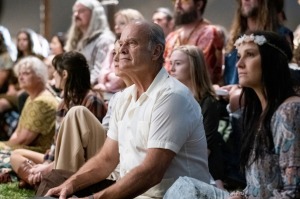Interview: Tullian Tchividjian on Coral Ridge Conflict, Billy Graham
The Christian Post recently met up with Tullian Tchividjian, senior pastor of Coral Ridge Presbyterian Church and grandson of Billy Graham, in New York City.
The following are excerpts from the interview.
CP: What brings you to New York?
Tchividjian: I was asked by Jim Lane, who ten years ago started New Canaan Society, which started off as a small group get together for Christian business guys out of his home in New Canaan, Conn. Now it has flourished and grown into 30 chapters.
Jim Lane's parents are members of Coral Ridge. His family and my family go back a long time.
I came and spoke this morning at their Manhattan chapter at Rockefeller Center. And I will speak at their New Jersey chapter.
CP: What did you speak about ?
Tchividjian: Basically my story. They don't want just a five-minute lecture or sermon. I based everything I said on Colossians chapter 1, which God used to rescue me from what I was going through in the summer of 2009 as a result of the transitioning at Coral Ridge. So, I talked about the way that God used pain to reveal my own idolatry and showed me that Jesus plus nothing equals everything. And I'll do the same tomorrow.
I kind of hang out with the guys afterward, hang out with them a little and talk to them a little bit.
CP: In Surprised by Grace you share your story of rebellion at age 16 and return to God's grace at age 21. You've been sharing this story at a lot of places you go. Are there moments when this grace surprises you all over again or do you get tired of telling your testimony?
Tchividjian: I don't. I grew up in a remarkable Christian home, the middle of seven children. My parents raised us well. They loved us well. Often in my home, we laughed hard growing up. They discipled us remarkably well.
I mean, they never gave me a picture of God through their parenting that was either harsh or hard-nosed. In the flavor of Christianity, the home was always warm, inviting and hospitable.
But being the middle child, I couldn't figure out where I fit in the home. I couldn't figure out whether I was the youngest of the older three or the oldest of the younger three. You know, when you don't know where you fit inside the home and you're young and you're desperate to fit in somewhere, I'd figured where I would fit outside the home. So I made some obviously bad decisions about who I hung out with and the things that I did.
All of that culminated at the age of 16 when I dropped out of high school, got kicked out of the house. My lifestyle got so disruptive to my family that my parents had no choice but to say, "You can't live here any longer if you're going to live this way." So, I was thrilled about it – thrilled! No teachers breathing down my neck, no parents looking over my shoulder. I'm finally free to do whatever I wanted to do. All that was great fun until I was 21 years old. It wasn't one particular event or one particular crisis, it was just culminating sense of there's got to be more to life than what I'm experiencing, there's got to be more to life than what the world is telling me. And that's when God, the hound of heaven, tracked me down, wrestled me to the ground and raised me back from death to life.
So that was my first experience with saving grace. Of course, prior to that, I experienced a tremendous amount of grace through my parents and through my family. They gave me a very good picture of who God was in general and specifically. It was great but it wasn't until 21 that He saved me. So that's when I experienced saving grace for the first time.
The Christian life has been nothing more and nothing less than a daily dependence on and a rediscovery of God's grace. My daily sins require daily distribution of God's grace. In that sense, it never ceases to surprise me because I don't deserve any of it. I mean, I deserve to be locked in a cage and for God to throw away the key.
Our hearts are continuously rebellious. Every time we sin in thought, word, or deed, we're essentially saying in that moment that, "I don't need you God. I don't want you God. I like my way better than your way." If this goes on day after day after day, year after year, month after month, it would understandable for God to say, "I've given you ten trillion tries. You're finished." But it's not. So in that sense, His grace is always surprising, never ceases to be amazing and His mercy is remarkably outrageous.
It makes no sense. That's why Paul said the gospel is foolishness to those who don't believe. It just doesn't make sense. God's grace is so counterintuitive and everything we do in our life is just based on conditions. You do this for me and I'll do that for you. Or if you don't do this for me, I won't do that for you. And God's grace works in a completely different direction.
So yes, in my book Surprised by Grace, I tell that same story, the story of Jonah. Basically, the story of Jonah is the story of the gospel. While our sin reaches far, God's grace reaches farther. God is relentlessly pursuing runners and rebels like us. That is the person of Jesus. God came after us not to strip away our freedom but to strip away our slavery to self, that we could become truly free.
So the gospel is all over Jonah. The story of Jonah really does prepare God's people for the arrival of Jesus.
CP: Also in the book, you spoke about the story of Jonah to make the point that the gospel is not just for Christians, not just for non-Christians. On what issue, cultural or spiritual, are Christians today displaying the Jonah-like complex?
Tchividjian: First, let address the first thing. I think it's super important for the church itself to rediscover the gospel. I think for far too long the Church has concluded that Christians don't need the gospel, it's simple what non-Christian people need in order to be saved. But then once God saves us, He moves us onto something else, something bigger, better or deeper. And the fact is that once God saves us He doesn't move us beyond the gospel, but He moves us more deeply into the gospel. The gospel doesn't just ignite the Christian life but it keeps Christians growing and growing every day. There's no reason to move beyond the gospel. There's only movement more into it.
I think that's really important. I think the story of Jonah shows that really well. It not only shows God going after non-Christians, the pagans, the Ninevites, but it shows God going after the good guy, the inside-the-church-guy, the religious guys, the prophet, the moral guy. That Jonah was running from God via his rule keeping just like pagans, the Ninevites, were running from God via their rule writing. God's grace goes after both types of runners.
Where is the flavor of Jonah in the church today? I think, for the most part, there are a still lot of people in today's church who can easily identify the idolatry outside the church and are pretty proud of the fact that they are not like them. And yet, we are far too slow to recognize the idolatry inside the church and more painfully, the idolatry inside our hearts.
CP: Are you referring to self-righteousness?
Tchividjian: Self-righteousness is unavoidable. You can either be a self-righteous Pharisee where you think you are better than everyone else or you can be a self-righteous pagan who thinks you are better than the Pharisee.
If you are a self-righteous person, I could become very self-righteous thinking that you're self-righteous and you think you're so good but I know you're bad. I know I'm bad so that makes me better than you.
I think there is tribalism is a big deal inside of the church, that the church thinks of themselves as a tribe and not a mission. I think we think we are here to protect ourselves from all the nastiness on the outside instead of we are here to sacrifice ourselves for the sake of the gospel.
Self-righteousness is a big deal. I mean all these things are connected.
Comfort is a big deal. [Some may say], "I don't want to go outside my comfort zone and interact with the kinds of people that I don't have anything in common with." I mean, Jonah not only hated the Ninevites, but he wanted to stay within the confines of his own comfort zone.
Yes, the stuff that God was teaching Jonah is no different than the stuff that God needs to teach us today. The problem has remained the same. The solution remains the same. There's nothing different. It takes on different expressions but it's no different really.
CP: There's this common notion among Christians that PKs or MKs are usually prone to struggle with their faith and go through a period of rebellion. Why do you think this is the case and are you ever afraid your children will go through this phase?
Tchividjian: Well, I don't know why that is the case for preacher's kid or missionary's kid. Certain situations differ for different people.
But I can say this. For far too long, because the church has moved away from the gospel anytime you move away from the gospel, you at the same time move toward pretense, you move toward image-keeping, you move toward the need to pretend. I mean the only thing that frees you from the need to pretend in order to make people believe you are something when you are actually not is the gospel because the gospel tells you that identity, my meaning, my security, and all of those things are in Christ. So now, I don't have to spend my life trying to measure up or making you think that I'm something when I'm not. That sort of thing.
The Church, and I'm generalizing, for decades has lost sight of the gospel for people inside the Church, the gospel for Christians. As result, the church pastors and missionaries have done a remarkable job of pretending, of learning how to put up a front.
Any kid who lives behind the scenes and see what's real and then sees the show are going to automatically think the absence of the gospel are going to lead to inevitable pretending, image-keeping, I got to measure up. That becomes a toxic culture for raising children because they see. They see what mom and dad are really like and they see what people think what mom and dad are, the image that mom and dad are eagerly trying to maintain. Parents are trying to do that because they are not secure in the gospel. They are not freed by the gospel.
CP: Are you worried that will happened to your children?
Tchividjian: Of course I do. I've got three kids, 14, 16, 9, two boys and a girl. I worry about them but the gospel freed me and freed my wife. We are not trying to make our kids think that we're super spiritual or we've got it all together. They see mom and dad being real people. What they see from dad upfront is not a whole lot different than what they see from dad behind the scenes. What they hear dad talking about at home is not different from what they see from dad [at church]. That won't guarantee that they'll avoid the whole PK, MK thing. But we are hopefully not contributing to what normally produces that crisis, which is pretending.
But yea, of course I worry. Not too much. I think about it. But my job is not to show my children that I'm the man, but to show them that Christ is the man.
CP: You're saying that the church is going away from the gospel. What do you think makes a church gospel-centered and how do you keep your church gospel-centered?
Tchividjian: I think it begins with those in leadership really understanding what the gospel is. The gospel is not about a lifestyle that we live, it's about the law-fulfilling life that Christ lived. So it's Christ-centered. It's ridiculously Christo-centric. It starts with that. Because you hear a lot of people who say we got to live the gospel, we got to do the gospel. That's a poor use of the English language, first of all. The gospel literally means "a good news announcement." It's a pronouncement. The word "evangelium" which begets the word evangelism carries military implications. It is a victory announcement. Victory is won on the battlefield. A messenger runs back to the city and says, "We've won." That's what an evangelist is to do, a gospel proclaimer.
There is a real need to define the gospel properly. It starts there. If you don't have a working, biblical, theological definition of the gospel, I don't know what your church does if the category is confusing. So it starts with the leadership being able to grasp it.
You can say I'm old fashion, but there's no program for this. Preachers just got to get it. They got to understand this. The moralistic, do-more, try harder, preacher that's in the church today has just got to be squashed. Preachers have to get a clear vision on how to preach the gospel from Genesis to Revelation from every text from the Bible. In Luke 24, when Jesus was on the road to Emmaus, he says the whole scripture is about me. It's all about me. So we don't just encounter Jesus when we get to Matthew, Mark , Luke and John. Jesus appears in the beginning of the Bible and he comes at the end of the Bible and everything in between. Preachers have to really figure out how do we preach the Good News on Sunday morning from every text of the Bible. That's huge. That's a mammoth-size challenge because I think real preaching has fallen on hard times.
CP: Back in 2009, there was a conflict …Well the conflict eventually culminated in a congressional meeting with the majority voting to affirm you as the lead pastor. You mentioned before that 400 or so people left to form their own church. How is your relationship now with your congregation and how is Coral Ridge now?
Tchividjian: It's unbelievable. That was a year and a half ago. It's the closest thing to a revival I've ever experienced in my life. The church is packed. Our sanctuary seats 2,000 people and I would say every Sunday, it's 80-90% full.
1,700-1,900 on an average. It's full and it's remarkable. People who have been there for a long time say this is healthiest the church has ever been.
There's a realness that I think is a byproduct of a radical commitment to the gospel. There's a focus on fellowship and community that's never really been a serious part of what Coral Ridge was. I mean, Dr. Kennedy did remarkable things and the Coral Ridge Presbyterian Church pulpit became a platform for him to do a lot of these other things, radio ministry, television ministry, that sort of thing.
A lot of people who have been there for a long time say we have recovered our identity as a local church, a church in the city of Fort Lauderdale. That's been a huge emphasis. There's been a major emphasis on outreach on our city dealing with foster care, adoption, homelessness, partnering with other churches in ministry. There's just a lot of help that flows from the commitment to the gospel which is a commitment to the city.
It seems like a lifetime ago that the meeting in Sept. 20, 2009 happened. It literally seems like a lifetime ago. My wife and I were talking about it on the way up here and she said, "Honey, it seems like 10 years ago."
It was the worst time in my life. Terrible. But I learned so much about me that I look back now as being the best time of my life.
CP: What are some of those lessons?
Tchividjian: Lesson number one, I never realized how much I've become dependent on human approval until God took it away. I didn't even realize that I was in a self-made prison of human approval and human acceptance. Didn't even realize it. Most of the prisons we live in we are not conscious of.
I was always in places where I was widely accepted, approved and loved and I was finally in a place where people did not approve of me, did not accept me and did not love me. It was killing me. During that time, God showed me Jesus plus nothing equals everything. And everything minus Jesus equals nothing. That set me free.
That enabled me to lead with the kind of courage, boldness, generosity, and sacrifice that I needed in order to push through that difficult time.
CP: Last year, you made several changes, one of them included merging the contemporary and traditional worship services into one service. What is the worship like now and what is the response of the congregation? Are there any disagreements?
Tchividjian: No, none of that. The congregation loves it. They feel the togetherness and oneness of their church in ways that if they had been at Coral Ridge for a long time they haven't felt in a while. All of the people who would have vehemently opposed that – we were calling it "Merger 2.0" – left after Sept. 20. So, what we were dealing with when we decided to go from two services to one was, for the most part, people adapting to change and trusting of leadership.
We knew it was going to be tough. Some people were like, "What is this going to mean?" It wasn't like they were opposed to going to one service but they were like what is this going to look like. But now that they've seen what it looks like for the last seven months, they love it! I mean, it's sophisticatedly blended. That's the best way I can describe it. And by blended I don't mean we sing a hymn on the organ and then we sing a Chris Tomlin. I'm talking about we sing old songs and new songs with a remarkable mixture contemporary and classical instrumentation in every song. So it's amazing to have the band in lead in the all the songs but get this 50-person choir in the back and this huge 6,000-pipe organ playing along with the band, along with the bass, guitar, drums and all that stuff. I'm kind of biased.
We would open with anything with the hymn "Praise to the Lord" and then seamlessly go into "Our God," the new Chris Tomlin song, which would then seamlessly go into "In Christ Alone," which would then seamlessly go into "How Great Thou Art." All vocalists, all instruments, all choir equally present in all our songs. The music director Mark is leading in the front with a guitar. He's has so sophisticatedly orchestrated all the parts. Everything is very remarkably fresh.
CP: Are there any other major changes you made to the church other than merging the service?
Tchividjian: No, other than the initial stuff like staffing moves or the stuff that was so played out like when I first got there they wanted me to wear a robe and I didn't want to wear one. The biggest change is the merging of the two services.
CP: What do you think about megachurches that have separate worship times?
Tchividjian: I just don't like it. I don't think we get the idea to do that from the Bible. I think that's sort of Madison Avenue marketing technique. It robs us of fellowship with people that we would not naturally choose to be with, whom by virtue of the gospel, we become brothers and sisters with. If you look at the gospel, it just doesn't break things apart. The gospel brings things together. One of the great demonstration of the gospel's power is reconciliation.
So if you look at some of the friends I have now, these were never guys I would ever have hung out with in high school. I was a surfer so I hung out with people who were surfers and made fun of people who weren't surfers and I listened to surf music and made fun of people who didn't listen to surfer music, you know. Now, I've got friends who are surfers, doctors, lawyers, artists and entertainers. Some people are cool and some people are geeky. I look around at my friends and I think, only the gospel has the power to bring a mulit-crew like this together and put together a friendship like this.
CP: There's a movement now where a lot churches get bigger and they start multi-site churches, where they have a main campus and branch campuses. Would Coral Ridge ever consider going multi-site?
Tchividjian: We haven't talked about it in terms of "what do you think about the multi-site model?" But it's not something that is imminent for us, number one. And we haven't thought it through enough to know what are the real pros and real cons are for us.
The one concern I would have with the multi-site model is I actually think one of most profoundly and deep pastoral moments between a pastor and his church is what happens between them before God in the context of preaching. I think something remarkable takes place when a pastor brings God's word. I just don't know if I'm a pastor over here at main campus and yes, people at campus A see on video, I'm never basically present with those people. There's going to be a pastoral disconnect at some level.
I know what (Tim) Keller does here at Manhattan, as he has been doing for years, they (Redeemer) would have service at different locations but he would actually be at all of them. They are not piping him in. I understand that. I mean, if a church gets to be 3,000, 5,000 people, man, it would be great to be in a group of 500, so we could have four rooms of 500 with the pastor there instead of one room of 2,000. Would that be a benefit? I would assume that would be at some level as long as the church stays philosophically, theologically, relationally connected somehow.
It's just we haven't given it a whole lot of thought.
CP: At Dr. James Kennedy's funeral, there was several evangelicals who spoke and there was concern whether there were young evangelicals who were willing to take on the legacy that many older evangelicals, the giants of the faith or the champions of the conservative movement, are leaving behind. And your brother Stephen expressed his willingness to carry this legacy on and spoke about a new generation of Christians. Do you consider yourself part of this new generation of evangelicals who are taking on the baton of faith?
Tchividjian: I mean, I'm young. I'm 38. In that sense, I'm a younger evangelical. I have been providentially put into a position of leadership so in that sense by virtue of providence, I'm younger and evangelical. Whether I want to be or not, I'm a leader under God's care.
As far as carrying on the mantle, there's just so many different mantles. On one hand, you have my granddad, who was an evangelist to the world, and on the other hand, you have Jerry Falwell who started the Moral Majority. And then on the other hand, you have Dr. Kennedy who really championed the reclaiming of America for Christ. Even right there, you have different mantles or different batons. These guys were not uniform in their mission or what God had called them to do.
CP: Do you feel called to carry any of those mantles?
Tchividjian: I feel called to preach. There's no question about it. I do what I can with the opportunities and resources that God has given me. As I told students at King's College today, I've got one bullet in my bullet chamber and it's called the gospel. And it's for Christian people and non-Christian people. My job as a pastor and theologian, really, is to tease out the nature and the necessity of the gospel in meticulous ways, in everything I say, in everything I like.
I mean I want desperately for the church in America to rediscover the power and the beauty and the nature and the necessity of the gospel. I want people to understand what I mean when I say it's not about coming up with a better evangelistic tool. That's not what I'm talking about. I mean what does it mean to be a gospel-centered person. What does it mean to live life in light of the gospel, what does it really mean to really understand and embrace the gospel? How does the gospel change the way we think, how does the gospel change the way we treat others, how does the gospel change the way we live.
I'm on a mission to do that. I'm happy to say I'm not alone in that. I feel like I'm part of a growing number of evangelical leaders who recognize this need to rediscover the gospel and find the gospel. So, I have pastor friends all over the country who are with me on this and I'm with them on this. At ministries like The Gospel Coalition, those guys who are on mission with me and me with them.
So I'm not interested in carrying on the legacy or carrying on the mantle, whatever that really means. I'm definitely not here representing the legacy of Dr. Kennedy or the legacy of my granddad or Jerry Falwell. I mean all those guys I respect but I'm not carrying on the legacy of John Calvin, Jonathan Edwards. I'm hopefully brokering the legacy of Christ to a new generation. That's what I'm going to do.
CP: What names come to mind when you think of people in your inner circle that you work with?
Tchividjian: I think guys like Matt Chandler, J.D. Greear, a friend of mine outside of a church in North Carolina. Those guys get it as far as I'm concerned.
There's a whole host of people. We are very grateful for guys like Tim Keller, Scottie Smith, Michael Horton. Mike Horton's a good friend. He is another one who is definitely on mission in that regard. Most of the guys who are associated with the Gospel Coalition I would say are working hard toward this direction as well. Mark Smith is a friend of mine.
CP: Everyone knows your grandfather, the world renowned evangelist Billy Graham. Have you talked with him recently and what did you two talk about?
Tchividjian: The last time I was with him was in August. I will be up there in March and up there again this summer. Then I'll be up there in October of next year.
And of course, every time I'm there, we hang out and spend time together.
Gosh, what do we talk about? He's doing remarkably well first of all. He's doing better now than he was a couple of years ago. His mind is sharp. He's with it. He's motivated to continue living and wants to preach one last sermon.
CP: When would that be?
Tchividjian: I don't know. He said that when he, if he, feels strong enough.
His mind is sharp. He's totally tuned in to what I'm doing. When we're together, he's asking me a thousand questions.
I talked to him on the phone since (last year), but his hearing is so bad so it's hard. But we go up there two to three times a year. Once a year, my whole family goes up there. But I'm usually up there once or twice a year in addition to that. Sometimes, I'll go up there just to spend two days with him, just to talk, not even anything in particular. When you're dealing with someone who's 92, it's not so much you have an agenda and have something to say. I just want to hang out. So that's what we do.
CP: In your relationship, what do you value most?
Tchividjian: Knowing that he is wildly supportive of me. I don't know what it's like…He's been a remarkable grandfather to me. I've been around him my whole life. It's not like I see him once every two years. He's been remarkable.
CP: What are your fondest memories?
Tchividjian: Every year, my grandmother and he would come down around Thanksgiving time and stay with us for about two and a half weeks. Although we were able to spend the whole summer with him but it was also aunts and uncles who came down to see him. But during Thanksgiving, he would come down and we would have him all to ourselves and stay with us. No agenda. Just hanging out by the pool and go out to dinner. Enjoying that they were coming to enjoy the Florida sunshine since it was getting cold in North Carolina. That time with them was probably my favorite memories.
Of course, numerous conversations when I was in college and South Carolina. My wife and I would regularly drive up and spend two or three days with them by ourselves. That was a real treat too because we would spend time with them when no one else was there, hang out and watch movies, eat dinner, be together.
He was a remarkably simply, humble guy.
CP: So, contrary to popular opinion, he's not spending his time preaching to you?
Tchividjian: Oh no, none of that. No way. I've never been preached to ever by him. When I was going through my rebellious stage, never once did he say, "You'd better get your act together son." Never, never, never. Accepted me and loved me and I told me he was there for me if I needed him and told me he was praying for me. Yea, that was it. An unbelievable gracious guy. Pretty real, very, very real, remarkable.
CP: What are other projects you are involved in? You said you have a new book coming out?
Tchividjian: Yeah, I keep myself pretty busy. In addition to my responsibilities at the church as senior pastor and preacher, I travel quite a bit. Usually, twice a month I'm going somewhere. Sometimes, it's three or four times a month. I'm in New York this week for The New Canaan Society and King's College. Two weeks ago, I was in Orlando for the Resurgence Conference for the Acts 29 crowd. Three days before that, I was at Catalyst Conference at the First Baptist Church in Jacksonville. I spoke at the Outreach Conference in San Diego in the fall. I spoke at the Desiring God conference in the fall. I do trips to colleges and seminaries. I spoke at Southeastern Seminary. I'm going to Covenant College. King's College today. I'll speak at Gospel Coalition Conference in April. Speaking at Matt Chandler's church in May. I'm sort of all over the place. I do a lot of traveling and speaking outside of my responsibilities at Coral Ridge.
And then I write. It feels like I'm doing a book a year. So between writing, traveling, speaking, leading Coral Ridge, preaching, and doing my best to be a good husband to my wife of 17 years and my three kids, that's about as much as one man or at least this man can do.
Next book comes out in October called Jesus Plus Nothing Equals Everything. It tells the story of the pain of 2009 as two churches merged together and what God showed me and how that taught me. It was through that pain that God taught me the gospel in some pretty deep, right ways. That's why I'm so passionate about not only individual churches recovering the gospel now but the gospel saved me in 2009 as a result of all the trials and tribulations. It's basically a book on the gospel, autobiographically illustrated throughout. So yea, it's Jesus plus nothing equals everything. That's sort of the equation of my life.





























